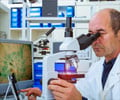American scientists have successfully engineered plant cells to churn out several chemical compounds, some of which are similar to cancer drugs.
American scientists have successfully engineered plant cells to churn out several chemical compounds, some of which are similar to cancer drugs.
"Plants already make compounds for us. The question is can we try to manipulate those pathways a little bit to get them to make variations on some of those compounds," New Scientist magazine quoted Sarah O'Connor, a biochemist at Massachusetts Institute of Technology, as saying.She and colleague Weerawat Runguphan chose the Madagascar periwinkle for their study.
The researchers revealed that the pink- and white-flowered perennial produces at least 130 toxic alkaloid compounds, which probably keep insects, microbes, and herbivores at bay.
According to them, these chemicals include vinblastine that stymies cell division, and has shown effectiveness in battling lymphomas.
Plants and all other organisms make chemicals via step-by-step pathways, each stage catalysed by a specific enzyme. The pathways responsible for making many of periwinkle's alkaloids, including vinblastine, are so elaborate that scientists have worked out few of the specifics.
However, O'Conner and her colleagues knew that an enzyme called strictosidine synthase was crucial in a step involved in converting one starting chemical to an intermediate in the chain.
Advertisement
According to them, simply growing up plant cells in the presence of the new starting material ensures they make a unique final product.
Advertisement
Though the resulting alkaloids vary only slightly from the compounds the periwinkle makes naturally, the researchers say that such tweaks could prove useful for improving medicines that plants already make.
O'Connor said that the one challenge before her team now would be to boost the amounts of drugs that plant cultures crank out.
Her team gathered about 1 milligram of chemical from 100 millilitres of cells, which, though an impressive yield, is not on the scale needed for commercial drug production.
Ideally, full-fledged plants, not cells swimming in broth, will pump out new drugs.
"You can regenerate the plant from the tissue culture. That's something we have been able to do," she said.
Bradley Moore, a biochemist at Scripps Institution of Oceanography in San Diego, California, said that plants might be useful to generate new medicines, but drug companies would probably turn back to microbes to produce these drugs in appreciable quantities.
However, this will require figuring out exactly how plants create drugs like vinblastine, then swapping all the genes into bacteria or yeast - no simple feat.
"That is the goal of this new science of green chemistry - being able to use organisms to do chemistry for us," says Moore.
A research article on this work has been published in the journal Nature Chemical Biology.
Source-ANI
SRM














